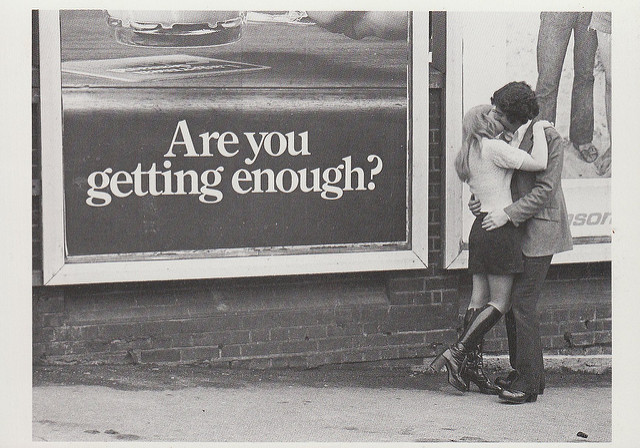Just over one year ago, I published a piece on elephant entitled My Top 3 Sex Problems as a Woman.
I outlined my own (very personal) problems around sex because I wanted to be open and honest about my struggles in order to invite others to do the same.
I used to work as an activist to stop sexual abuse, and if there’s one thing I learned, it’s that evil thrives in darkness. The more we bring sexuality out into the light to be expressed in a healthy way, the more we protect the vulnerable and create a better, safer, and sexier world for all.
In that spirit of sharing and openness, at the end of the piece I invited people to take a survey. The questions were simple:
>> What are your top three problems when it comes to sex?
>> What are your top three problems when it comes to dating?
>> What are your top three problems when it comes to relationships?
I wondered whether I was alone in my sex problems as a woman. I was dying to know what men would say. I was curious to see what trends would emerge.
I was seeking the truth.
I figured I’d be fortunate to get even 100 responses. I got over 1,000.
When I started reading them, I was regularly brought to tears. I also laughed aloud, nodded vigorously in solidarity, and felt tremendous love and pain. The suffering and satisfaction practically leapt off the page—the collective voice of all those willing to share their most vulnerable and authentic truth about this charged topic.
Now it’s time for me to share the results with the world.
First, a few notes on the data:
- Each respondent could give three separate responses to each question, so you’ll see the percentages don’t add up to 100 (they still show the critical trends).
- I’m including only the sex results in this article. The dating and relationship questions will come later.
And a few quick demographics:
>> The total age range of respondents was 16-72, with an average age of 37.
>> 85 percent identified as female, 14 percent male, and ~1 percent as “other.”
>> 45 percent said they were in committed relationships, 33 percent were single, and 22 percent said “it’s complicated” or “other” (many said they were separated from spouse).
>> 85 percent identified as heterosexual; 12 percent as bisexual; 1 percent as gay; 3 percent as “other.”
Thus these are people mostly in their 20s, 30s, and 40s, mostly hetero, about half of whom were in relationships, and half of whom were single/single-ish.
Here were the top problems listed by the groups:
Top 5 Sex Problems for Women:
- Trouble orgasming: 24 percent
- Pain/It hurts: 23 percent
- Communication: 18 percent
- Not enough foreplay: 18 percent
- Relaxing/Letting go: 4 percent
Top 5 Sex Problems for Men:
- Pleasing partner: 17 percent
- Partner not initiating: 17 percent
- Performance anxiety: 12 percent
- My sex drive is higher: 9 percent
- Not having/getting it enough: 8 percent
First thing to notice: If you’re a woman for whom orgasming is a challenge, or a man who doesn’t always know how to please his partner, you are not alone.
I spent hours, days, weeks analyzing the data, and here are my other biggest takeaways from the sex category (note: these are mainly hetero-normative, since the vast majority of the responses referred to heterosexual sex):
1. For a lot of women, sex hurts.
It’s hard to talk about this one.
First, several brave women said their biggest sexual issue was trying to enjoy sex after rape or other sexual trauma.
That is, frankly, heartbreaking. Not only were these women violated either as girls, teens, or adults, but now sex is painful for them. Their voices came through clearly: they desperately want to enjoy it, they just don’t (yet).
I have a lot to say about this, but for now I’ll simply say this: one of my closest friends is a survivor of sexual abuse. She has gotten a lot of somatic therapy, uses a jade egg, and now has scorchingly hot sex with her fiancé. It is possible, you can get there, and you deserve to get there.
Second, for a lot of women, it’s not that sex hurts all the time, but that many of the men they’re sleeping with hurt them (probably without meaning to). Thus responses like:
>> “Fingering too rough causing anxiety rather than stimulation.”
>> “Painful intercourse.”
>> “Too much pressure/too rough.”
>> “Men are rough. I call it porn sex.”
>> “Fear (like I need to protect my body from painful and unwelcome stuff).”
This was also difficult to read over and over again. To be honest, I got really sad reading response after response like this.
But I also felt hope, because I truly believe a lot of this is fixable with the right information and communication. Especially since:
2. Men really want to know how to please women.
It seems that for many men, figuring out how to please a woman is a mystery wrapped in the shroud of an enigma packed in a big box of WTF:
>> “I can’t tell whether what I’m doing is working or actually turning her on.”
>> “I don’t know how to tell if I gave a woman an orgasm or not. This is compounded by the fact that I can’t get feedback because asking if it happened is a turn-off (e.g. showing a lack of sexual prowess), which results in no orgasms anyhow.”
>> “I’ve heard the conventional wisdom, ‘If you don’t know if you’ve given a girl an orgasm, then you probably haven’t,’ which makes me even more insecure.”
>> “A lot of women I’ve met almost seem like they expect me to know how to please them, but it requires a little direction. Don’t be afraid to tell me you don’t like something, or would rather me do something else. Guide me. Not everything I do will appeal to every partner I have. Direct me, and show me the way. This is a mutual thing, and if only one of us enjoys it, what’s the point of having sex?”
I really feel for men here. For many, it seems like figuring out how to pleasure a woman is like trying to escape from a pitch-black room with a lot of furniture in it. You do your best while you stumble around, hoping not to run into anything bad and eventually find the right door that leads to the holy land.
As a woman who has sex with men, I was also touched by these responses. It was an important reminder that most men really do want women to enjoy themselves during sex. They’re not just looking to “score”—they care that she’s having a good time.
This renders the next point even more poignant:
3. Women don’t know how to talk about sex with a man without hurting his feelings.
Again and again and again and again, women mentioned wanting to give their partners feedback about sex, but feeling afraid of bringing something up and hurting him. They said things like:
>> “I struggle to express what I want during sex. I’m afraid of making the other person feel inadequate.”
>> “Communication! Speaking up in bed while trying to balance pleasing myself and not hurting my partner’s ego.”
>> “Not wanting to tell my partner when he does something I don’t like. Men take it personally and seem to think because they’ve successfully pleasured one woman with something that it should/will work with all women.”
>> “My partner likes going down on me, but he’s not very good at it. I don’t think he knows where to focus the energy and stimulation. I try to tell him, but don’t want to hurt his feelings or ego.”
>> “How to communicate when I don’t like something without shutting my partner down.”
The data is clear: this is a huge issue for women.
So to recap: we have a whole lotta men who want their women to enjoy sex, and a whole lotta women who are terrified of being honest about what’s not working. The women aren’t speaking up about it, to the point where they’re tolerating quite a bit of pain—which is the opposite of the sexual experience men want them to be having.
I have about a 100,000 more things to say about this whole thing, but at the risk of causing overwhelm, we’ll save that for another time.
I am determined to improve our sex lives, people. Especially because when we feel truly sexually fulfilled, seen, and accepted, we feel connected.
And connected people are a lot more able to keep the faith.
Connected people are more likely to keep marching.
Connected people will build the world we actually want to live in.
We need healthy sexuality and relationships to have a healthy world. So, hot sex for everyone in 2017! Who’s with me?!
I leave you with a few more highlights from the survey results, so at the very least, you know you’re not alone:
>> “Broaching the subject without feeling pushy or apologizing.” ~ Male, 29
>> “Fear my partner will lose interest if I’m too ‘difficult.’ That is, if I take too long or if I don’t orgasm.” ~ Female, 48
>> “Focusing too much about meeting his needs and not enjoying myself and our sexy time.” ~ Female, 30
>> “Being afraid to ask for something in fear she’ll think you are weird or gross.” ~ Male, 44
>> “I have no problems telling a partner to touch me lighter, but they don’t always get it. Then it takes a while, I get frustrated, I feel he’s frustrated, then I just don’t want to anymore. I unfortunately don’t have a lot of sex, I think I have a low drive, too. All things put together, I often feel ‘broken.’” ~ Female, 42
>> “Feeling insecure about initiating sex all the time and not waiting to come across as demanding. Trying to be a man ravishing my lover but still being sensitive to her needs and desires.” ~ Male, 60
>> “People thinking ‘bisexual’ automatically means ‘promiscuous.’” ~ Female, 45
>> “Inability to obtain or pay attention to quality feedback.’Porn-style’ vocal feedback is the only thing they use to judge success; in other words, jab something until the girl makes a sound, versus exploring and watching and feeling for subtle clues of pleasure.” ~ Female, 47
>> “Always be hard—like don’t lose the underwear until ready to impress, and never droop so she won’t feel I’m bored.” ~ Male, 40
>> “Am I doing it right? Am I doing something wrong? Am I bad at sex?” ~ Female, 44
>> “[Women being like] starfishes—no positions, lay there and no noise, makes you feel like a rapist.” ~ Male, 39
>> “What if the one day she actually initiates is the one day I just want to take a nap?” ~ Male, 40
>> “Top problem: a small child that invades our bedroom.” ~ Female, 35
If you want to be notified when I publish the next batch of survey results, go here.
Author: Melanie Curtin
Image: Michelle B./Flickr
Editor: Emily Bartran












Read 1 comment and reply